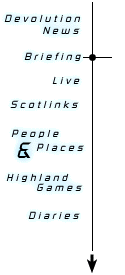
The Politics of Devolution - Party Policy
The Labour Party

|
A turn around in policy began in the late 1960s, when the nationalist parties in Scotland and Wales began to gain support. Plaid Cymru had gained their first MP at Westminster when Gwynfor Evans won the Carmarthen by-election in July 1966. This success for the Welsh nationalists was followed in November 1967 by the victory of the SNP's Winnie Ewing in the Hamilton by-election. Both Carmarthen and Hamilton had been considered to be safe Labour seats. They reverted to Labour in the 1970 election.
In 1969 the Crowther (later Kilbrandon) Commission was appointed by the Wilson government to consider devolution. Its recommendations were published in 1973. It favoured a directly elected Scottish Assembly and approved the principle of devolution in general. In September 1974 the Labour Government published the White Paper, 'Democracy and Devolution: proposals for Scotland and Wales' putting forward proposals based on the Kilbrandon Report.
In the General Election of February 1974 Plaid Cymru won two seats and the SNP increased its number of MPs from two to seven. The General Election of October 1974 brought even greater successes for the nationalist parties: the SNP now had 11 MPs and Plaid Cymru had three. The election of 14 nationalist MPs put pressure on the Government, which had won a majority of only three, to act on its commitment to devolution. A combined Scotland and Wales Bill was introduced in 1976, it was withdrawn and replaced by separate Bills for Scotland and Wales in 1977.
The Conservative Party

|
However, the current line is that the union is mutually beneficial and any move towards devolved assemblies for Scotland and Wales would be the first move towards the break-up of the United Kingdom. The Conservatives oppose devolution on the grounds that Labour's plans are ill thought out and could create rivalry and conflict between these parliaments or assemblies and the parliament at Westminster. They also point to questions about the level of representation of Scottish and Welsh MPs at Westminster following devolution (the West Lothian Question). However the Conservative party has said that it will field candidates if a Scottish Parliament and Welsh Assembly are established and that it will not abolish institutions approved by referendums.
The Liberal Democrats

|
In the joint Labour-LibDem Statement of March 1997, the LibDems indicated that, despite their disagreement with Labour's intention to hold pre-legislative referendums in both Scotland and Wales, they would not seek to frustrate or delay the referendum legislation. They will campaign for a 'double yes' in the referendum in Scotland.
They feel that Labour's proposals in Wales are not extensive enough and want to see a devolved assembly (Senedd) with powers equivalent to those proposed for a Scottish Parliament, including law-making and tax-varying powers. Despite the policy differences between them on this issue, the Liberal Democrats have said they would campaign for a 'yes' vote in the referendum.
The Scottish National Party

|
Traditionally, the SNP has had most success taking seats from the Conservatives. During the early 1980s the party went through a period of internal upheaval as the socialist '79 group clashed with the more purist nationalists. The socialists won the battle for control of party policy. The SNP has failed to win seats from Labour other than at by-elections, despite moving up to second place behind Labour in many central belt constituencies.
The SNP supported the Labour Government's plans for devolution in the 1970s, and campaigned actively for a 'yes' vote in the referendum. After the referendum failed to secure a mandate for devolution despite 51.6% of voters voting 'yes', the SNP tabled a motion of no confidence in the government. This was followed by a motion of no confidence which was tabled by the Conservatives but supported by the SNP. This motion was carried by one vote on 28 March 1979.
The SNP did not take part in the Scottish Constitutional Convention and has argued that any referendum should include a third question offering the option of independence.
In advance of the White Paper's publication, the party met with Scotland Forward (the umbrella group campaigning for a 'Yes, Yes' vote), and seats were reserved on the group's board for SNP representatives. Subsequently, at a meeting of the party's National Council in Perth on 2 August, the leadership's proposal to back the 'double yes' campaign was endorsed. Three SNP members are now on the board of Scotland Forward.

